The Struggles of Being an INFJ Child
Today’s subject is going to be a little tricky because I’m talking about my own personality type. As an INFJ, I always find it difficult to write about my own type because I feel that it can sound arrogant or self-aggrandizing. I can applaud other types without feeling like I’m patting myself on the back, but with the INFJ type, it feels weird talking about certain strengths because I feel like I’m bragging. That said, INFJs are often one of the most misunderstood personality types because they comprise only 1% of the population and are often surrounded by people who don’t quite understand their strengths or sympathize with their weaknesses. So I feel like it’s especially important to address some of the issues they face as children.
INFJs as children (and as adults too) can often seem like a bundle of contradictions. On one hand, they are extremely imaginative and open-minded – on the other hand, they are stubborn and staunchly hold to their ideals. They are sensitive and greatly desire harmony, but they have no problem speaking out or defending a cause they firmly believe in – even if it ruffles a few feathers. They can go from being the shyest, most sensitive children to the most outspoken, single-minded leaders of their beliefs. Because they are a rare personality type they can often feel misunderstood and isolated as children. Many times, when they discover their personality type, INFJs feel a huge sense of relief because their whole lives they’ve felt somehow separate from everyone else. Not better than everyone else – just like they don’t quite fit in anywhere.
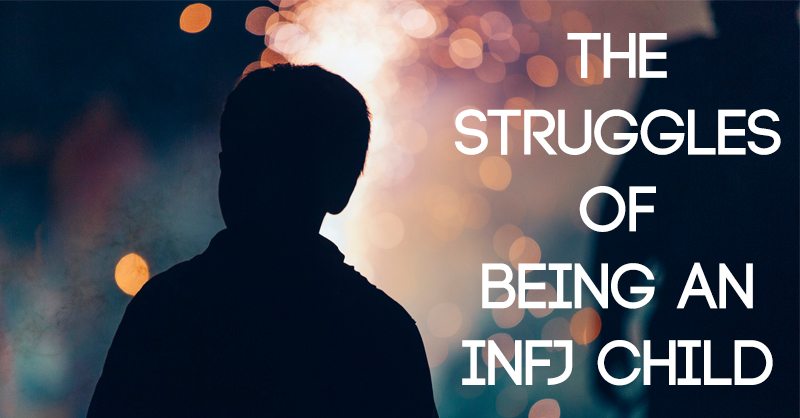
Want to know what your child’s type is? I have created a personality test to help you figure it out. Just remember this should be used as a guide and not definitive proof of your child’s type.
P.S. If you want even more in-depth information on INFJs and relationships, careers, parenthood and more check out my eBook: The INFJ – Understanding the Mystic.
INFJ Children and Introverted Intuition
Children up to age 13 really only master their dominant function very well. Their other functions remain relatively immature. INFJs have Introverted Intuition as their dominant function. This means that they are always trying to figure out the connections between things, and trying to understand the bigger picture. To them, life is one big puzzle and every piece fits into a larger whole and everything has meaning. They can be very serious about their theories and ideas, and can also be quite whimsical and imaginative. Many INFJs mention that as children they struggled with accepting reality for what it was. Sensors are much more aware of what is and take things at face value – while Intuitives are more apt to see what things mean and to look beyond the surface in a way that makes them a little unsteady in the physical world. INFJs may approach the physical world with a certain hesitancy, and can be a little clumsy and awkward in their physical environment because of their inferior Extraverted Sensing.
“Introverted Intuition (Ni) is a function that requires a lot of solitary time to process. INFJ children often need to escape from everyday life to be able to enter the recesses of their minds and reflect and let their mind reveal various insights to them.”
– The INFJ – Understanding the Mystic
INFJs can be a little obsessive about their goals or interests, and this is because Ni (Introverted Intuition) is a very singularly-focused function. Ni is intensely focused on one big idea or one main interest that connects everything else. One sure way to aggravate an INFJ child is to break into their meditative Ni-state with loud, sensory stimulation. They tend to get easily overstimulated and can become so caught up in their ideas that they are easily startled when faced with an interruption.
Related: 10 Ways INFJs Can Boost Their Creativity
Young INFJs and Burnout
INFJ children are often repeatedly told to stop daydreaming so much, to pay attention, focus on the task at hand, and get their head out of the clouds. What many well-meaning parents don’t understand is that the natural comfort zone for an INFJ is in their own mind. If they are forced to extravert too much, to engage too often with the physical world – if they are raised spending 7 hours a day in school and then 3 hours in after-school activities – they will quickly burn out. If you look at well-known INFJs – Carl Jung, Dante Alighieri, Fyodor Dostoevsky, they often reached their best conclusions and ideas alone, deep in thought. We wouldn’t have many of these great writers and philosophers if they hadn’t been allowed to immerse themselves in their passions and thoughts fully. Parents of INFJs should do what they can to ensure that their children are given a good amount of alone time to think and reflect. Bonus if you give them plenty of notebooks and pencils to record their thoughts and ideas!
This isn’t to say that INFJs want to sit around in the dark all day. I’m also not saying that you should just let them do whatever they want. Clearly, there are times when INFJs need to pay attention and focus on present realities – it would be unhealthy for them to not exercise that skill. You’ll find that when a young INFJ has a passion, plan or goal they are extremely proactive and productive. Dante himself said “The secret to getting things done is to act”, and INFJs are often urgently aware of the swift passage of time. Once they’ve deciphered their plan they are anxious to achieve it. Give them a chance to discover their dreams and ideas, and then they’ll likely surprise you with how productive and thorough they can be with making their goals a reality.
Related: ENFJs, INFJs and Empathy Burnout
Young INFJs and Overstimulation
Because INFJs have inferior Se (Extraverted Sensing) they can become easily overwhelmed with an excess of sensory stimulation. Being Ni-dominant types, they prefer the world of their mind and quiet places they can access their thoughts easily. As children if they are frequently in an environment of noise, interruptions, little privacy, etc,..they can become highly stressed. Things like a TV that is always on, frequent loud music, or even sharing a room with noisy brothers and sisters can be especially difficult for the INFJ. While they may enjoy a good movie or a good romp with their siblings, they are easily overstimulated and are extremely sensitive to the sensory world. Too much sensory stimulation can cause the young INFJ to fall ‘into the grip’ of their inferior function; extraverted sensing. When this happens, the INFJ may become uncharacteristically indulgent and rash. They may have issues with binge eating, physically harming themselves, or making extremely impulsive decisions. They will seem more like unhealthy ESTPs than INFJs when they are in the grip. INFJ children who are triggered by sensory overstimulation can become extremely unhealthy, stressed, and out of balance.
It’s very important that INFJ children have a chance to be alone every day for a good period of time. Keep in mind, they also have strong feelings for others, and will enjoy one-on-one and quality time very much.
INFJs and Emotional Sensitivity
INFJs are extremely in tune to the emotional environment, and they keep a constant eye on how everyone is feeling. They tend to pick up on and absorb the emotions around them because of their auxiliary Fe (Extraverted Feeling). Something to keep in mind is that INFJ children haven’t quite mastered Fe yet – and the combination of strong intuition and often hypersensitive emotional awareness can make them get carried away with their imaginations and feelings. If they sense something is wrong in the emotional climate, they may imagine all kinds of terrible and horrific reasons for what is wrong. It is very common for young INFJs to worry about unrealistic dangers and outcomes as children. Paul D. Tieger and Barbara Barron-Tieger, authors of Nurture by Nature: Understand Your Child’s Personality Type and Become a Better Parent, say “They (INFJs) especially worry about the important people in their lives and even about strangers experiencing difficulty or anguish. While they may not actively intervene, they are affected by the suffering of others. INFJs are easily embarrassed, tend to cry easily, and apologize quickly. Harmony in all of their relationships is a high priority for INFJs.”
I know as a child I can relate to all of these things. I was extremely aware of how everyone in my family was doing, and if I sensed that something was ‘off’ even just a little bit I would lie awake at night trying to pinpoint what it was. Sometimes I would come up with terrible conclusions and ideas about what was wrong with a certain family member. Sometimes I would feel anguish over a person we passed in the street who seemed distressed. I remember getting sick to my stomach with worry over seeing a young boy walking down the sidewalk who was smoking. He was way too young to be smoking in my mind, and I was stricken with horror and concern for him. For days I couldn’t get rid of that sick, worried feeling. I didn’t know who he was and had never seen him before.
These kinds of experiences and feelings are very normal for young INFJs, and it is good for them to have a parent who takes the time to listen to their worries and address them without belittling their sometimes unrealistic concerns.
Related: INFJs, ENFJs and Empathy Burnout
INFJs and the Overactive Imagination
Young INFJs hold very tightly to their intuition and gut feelings – and rightly so, because their intuition is their strongest function. However, as children, they’re still developing this function and it’s not perfectly balanced yet. It can kind of overtake everything else and cause the young INFJ to feel pulled along by it. Young INFJs may have gut feelings that certain situations are unsafe, and in some cases they may seem very paranoid. Many young INFJs are little conspiracy theorists – never quite sure of the world around them, never quite sure if they can trust it. For me personally, I didn’t trust elevators when I was a child for a long time. You never knew if one could go plummeting to the ground. I used to take the stairs while the rest of my family took the elevator. I was worried my eyeballs would fall out if I wasn’t careful. I was worried my family didn’t love me and that it was all pretend or an act. I would find myself worrying about certain things obsessively, but yearning to let go of the worries just as incessantly.
Night time was a terrible time full of fears and dangers in my mind. I would lie under my blankets, terrified, just hoping the night would end. Having the ‘there are no monsters under your bed’ talk didn’t help. I wasn’t worried about monsters, I was worried about demons and devils, and because I grew up in a religious household those fears were quite real to me. Many INFJs report similar childhood experiences; you see, the INFJs imagination, and their certainty of their conclusions causes them to believe very firmly in their suspicions and future forecasts. They trust the physical world, their physical senses, much less than they trust their mind and their predictions. This is something that the sensor world often struggles to understand about INFJs, especially if they are parenting them. While sensors, who make up roughly 75% of the population, trust the physical world and are more concrete in their thinking, intuitives trust their mental world and their imagination more fully and can be more prone to existential worries.
Related: 3 Weird and Wonderful Secrets About the INFJ
Shyness and Strong Convictions
INFJ children are often very shy and sensitive to new people. They very much want to have a close friend or two, but usually have a hard time breaking into social settings. They are naturally very private children, but at the same time, they strongly desire to be liked. They simultaneously need a great amount of alone time and also some quality time with others that they can emotionally connect with and nurture. Yet their shyness can make it very hard for them to break out of their shell.
INFJs won’t ‘go along’ with the flow very easily if they don’t believe in something or feel that it goes against their convictions. They will fight against all their desires to be liked if their beliefs are mocked or if they don’t believe something is right. This can surprise some of their friends because they are so used to the INFJ being quiet and shy and ready to please. INFJs can become fiery, outspoken, and persuasive if challenged about their core beliefs and convictions – and they will stand up to literally anyone who challenges them about these convictions, no matter who they are – teacher, parent, friend, or enemy. It can seem as if they become a different person entirely if their values are challenged or threatened.
The writer at Oddly Developed Types (a site that is no longer online) described the INFJ in social situations well: “While INFJs may be seen as withdrawn or even secretive, the truth is that they care quite a bit about what others think of them–sometimes too much. They take criticism very personally, and may be unintentionally hurt by others. When this happens, an INFJ may hold their hurt inside and let it stew, never really expressing how they feel. Instead of confronting the person who hurt them, they may take the less painful route and simply avoid the other person or even cut them off entirely. Other people may see the INFJ as “too sensitive,” while the INFJ for their part sees others as “unsensitive.” Conflict is anathema to this type, unless said conflict is undertaken in the service of a cause the INFJ is upholding.”
Related: Four Reasons INFJs Struggle with Loneliness
INFJ Children and Perfectionism
INFJs are extremely perfectionistic with themselves and hold themselves to very high standards. While they can be very accepting of others, they usually have a difficult relationship with themselves. Because they have strong Extraverted Feeling, they are very aware of the moods and emotions of those around them – at the same time, they can be oblivious to their own moods and emotions and can be very overwhelmed by them. This might frustrate them to no end as they want to just move on and get things done but they feel immobilized by emotions and feelings they don’t understand. They want to succeed at everything they try and are very hard on themselves when they fail.
INFJs can also get trapped in their idealism. They long for a ‘perfect’ world and want to try to make the world into their vision of what it should be. They set unattainable goals and feel crushed when they fail. If you’re a parent to an INFJ, it’s good to try to talk to them about their dreams and goals – let them know you admire their idealism, but try to think of baby steps they can take to accomplishing things. Try to help them to not get bogged down by all the pressure they put on themselves – and try to praise them for their accomplishments Verbal affirmation means a lot to young INFJs and gives them the confidence to keep going.
Related: The INFJ Workaholic
In Conclusion…
There is a lot more I could write about INFJs, but considering this post is already 2000 words long I think I’ll give it a rest for now. I hope that if you are an INFJ that this gives some validation or makes sense of some of the struggles you had as a child. I hope that if you are the parent of a young INFJ that this gives you some insight into what they might be experiencing and going through. If you have any comments or questions please feel free to let me know! I’d love to hear from you.
Want to find out more about the INFJ in childhood and beyond? Get my new eBook The INFJ – Understanding the Mystic!
Find out more about INFJ children in 7 Things That INFJs Experience as Children.
This post contains affiliate links. I only recommend products I truly believe in.
Sources:
Nurture by Nature: Understand Your Child’s Personality Type – And Become a Better Parent by Paul D. Tieger & Barbara Barron-Tieger
Please Understand Me II by David Kiersey
The Neuroscience of Personality by Dario Nardi, Ph.D.
Gifts Differing: Understanding Personality Type by Isabel Briggs-Myers
Personalityjunkie.com
Get Your Free INFJ eBook
As a thank you for subscribing to my newsletter I will send you this free eBook PACKED with self-care tips, creativity hacks, and more! You'll also get a 3-day email course for understanding your personality type better!


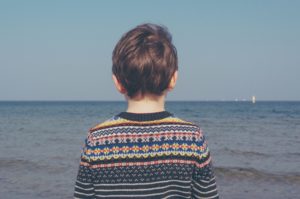
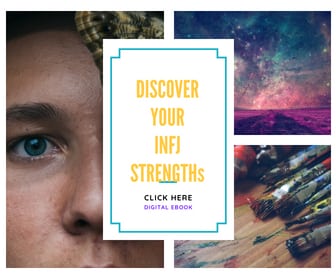
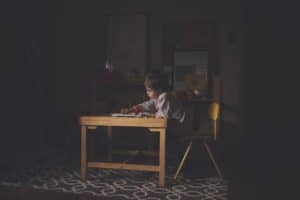
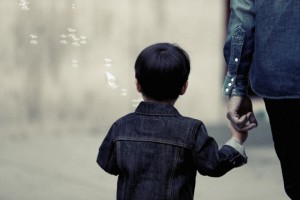
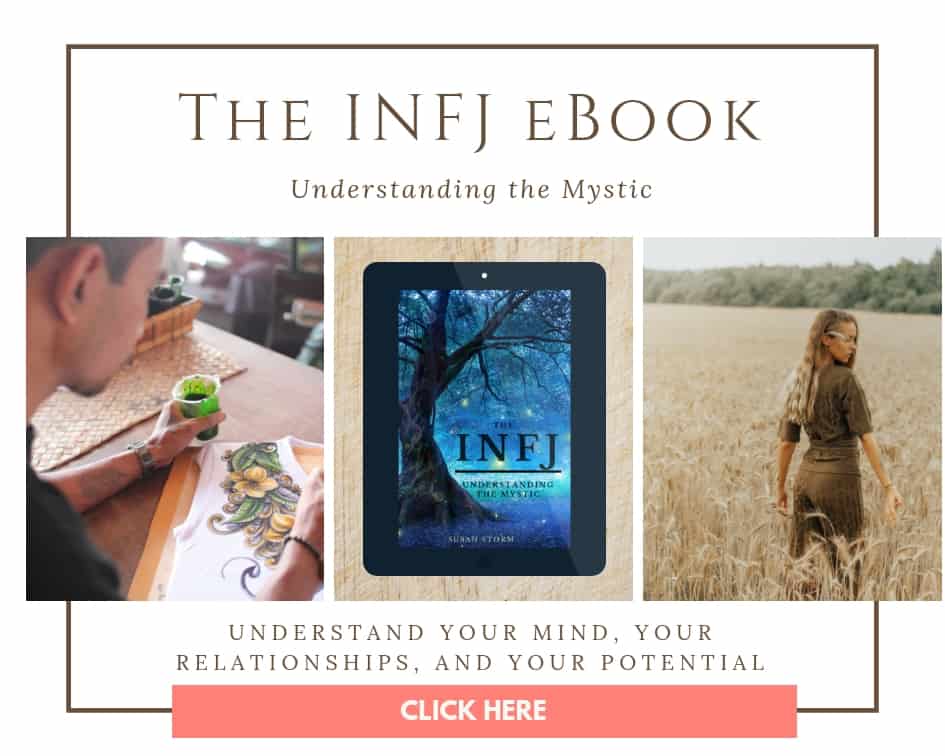
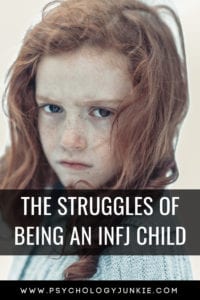
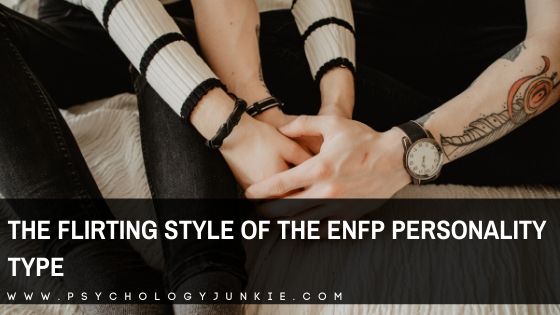
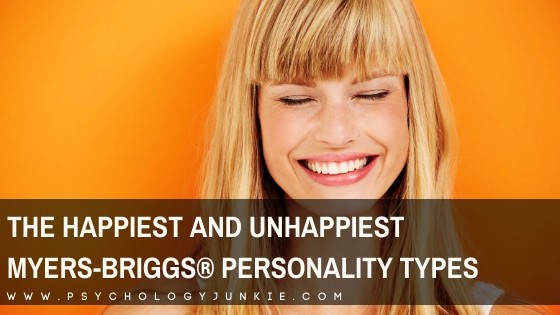




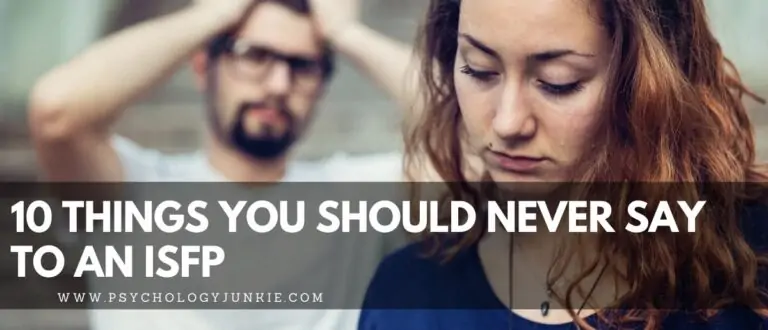
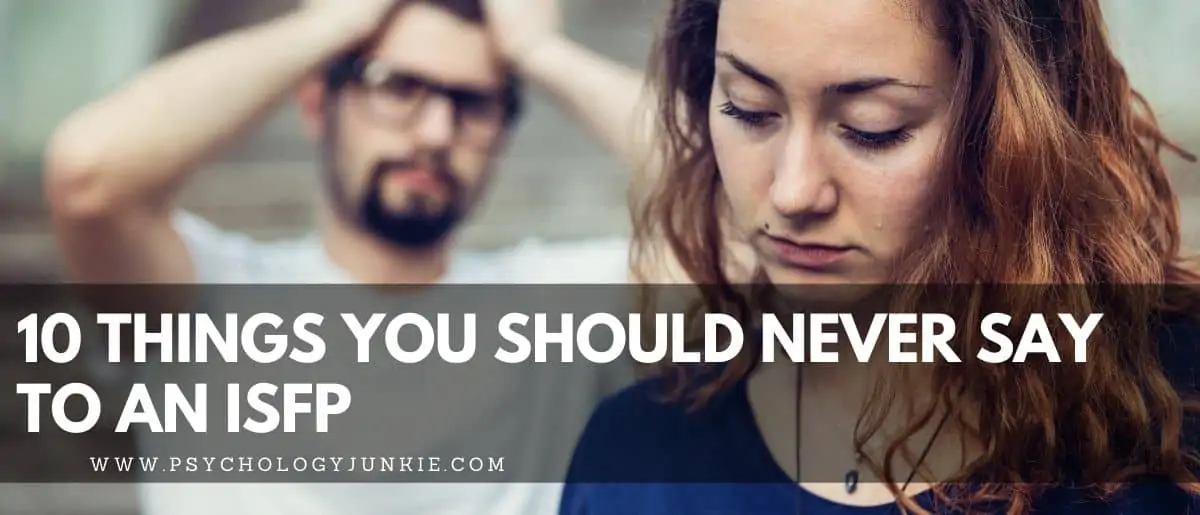


I’m an INFJ and I think you summed me up perfectly. Thank you for writing these blog posts by the way, I’ve read your other INFJ posts and I love them! Especially your one on Loki- that’s how I found your blog (through Tumblr). 🙂 It’s comforting to know that there are others who feel this way, particularly because I do not know anyone else who is an INFJ at Sixth Form or in my family.
Thanks so much for your comment! That means a lot to me. I completely agree with you that it’s very comforting to know we aren’t alone in the world – there are other people who go through a lot of similar struggles. Thanks again for your feedback, I really appreciate it 🙂
Oh yes, this struck a chord with me! 🙂 I don’t have a lot of very detailed memories from my early childhood, but two things came to mind just now as I was reading your article.
In Germany we have a fairytale called “Hänsel und Gretel” where two orphans – brother and sister – wander into the woods and come across this house made of candy in which a witch lives who tries to eat them (why are fairytales always so cruel …?). I remember outrightly refusing to go into any kind of forest for a long, long time and there where two places in our appartement where I was always expecting a witch to jump out at me.
Another thing I remember is a phase where, whenever I said goodbye to either of my parents, I mentally said goodbye to them as if this was going to be the last time I’d ever see them again, because I was weirdly convinced/scared that they’d die before I would see them again.
Anyways, thank you for this article and your fantastic website! It’s much appreciated!! 🙂
Thank you so much for the kind feedback! Oh yes, I’ve heard of Hansel and Gretel – that story has terrified too many children for ages! I was scared of old people when I was little, actually, and I wouldn’t be surprised if fairy tales had something to do with that! I also completely relate to the saying goodbye part. Whenever I say goodbye to anyone for any extended period of time, and even sometimes for short periods of time, I imagine ‘what if this is the last time I see them again?’ and all the sudden I can feel it and picture it so vividly that it makes me very sad and I feel like I need to show them in some way how important they are to me. I really appreciate your input, it was a big encouragement to me. Thank you!
That’s a bit weird, because that strikes two things in my early childhood as well. I’d have nightmares about two things constantly as a child. One was a witch that flew to my house if we ate ice cream on any day other than Sunday (house rule). She terrified me out of sleep every night hovering on her broom outside and bringing things to life in the house. Bit by bit I got further in the dream til I finally got to the end and escaped to Grammy’s across the street.
My other nightmare surrounded losing one of my parents and watching their soul go to heaven and wanting to stay with them, but I couldn’t. I would wake in a sweat or cried myself awake and then go check on them.
This was totally me as a child, and even today at nearly 50. I am almost positive my ten year old son is INFJ and I suspect my father is as well. I so want to give my son the tools to avoid being abused by narcs and sociopaths. Thank you for putting this out there. Understanding these personality types has brought me a great deal of peace and understanding.
Thank you so much for the feedback! I realized as I was writing this post that a lot of this will still apply to us as we’re older. I know I still have an overactive imagination and a lot of the same issues I wrote about. I wish you all the best with your ten-year-old son, he’s very lucky to have a mom who cares about him and tries to understand him and help him through life!
I am infj and some of the early childhood fears hit home. I hated the prayer “now I lay me down to sleep”. I was afraid to go to sleep, I thought I was going to die. I have never said that prayer to my daughter.
Thanks for your feedback! I am sorry you dealt with that kind of fear – I can totally relate to what you’re saying. If I had listed all my childhood fears in this post it would have been probably another 2000 words long! Being an INFJ child can be rough, but also full of wonderful things too.
I totally agree with the views Susan Storm (I hope I read and wrote your good name correctly). I am INFJ too. From Kenya. I have not found another in my country. Reading blog connects me in a way am deeply grateful to have other INFJ.
Grew up somewhat shy and easy to embarrass, deeply spiritual ….I feared losing my loved ones. Especially when my mum travelled, I thought she would not be back. That terrified me. Was raised by mum singlehandedly. I love how she has been a force of strength and encouragement through the years.
I thought would wake into an angel or a spiritual being. I also felt deeply for those with needs. I could do anything to help as a child. Oh I loved helping people, I still do but now I realise we are not all the same. We have our peculiar differences.
My extraverted feeling left me baffled. I wondered why I escalated from being so talkative to being so quiet. Really wondered whom I am. At the time knew only the 4temperaments. Was sure was not a sanguine but sometimes talked much like one.
Thank God two years ago at 25. The mystery was solved when I continually type INFJ. I am grateful to God He made us as we are. Even other types are amazing.
Would enjoy knowing other INFJs at a personal level.
Hi Gloria! So glad to meet you! Thanks so much for reaching out to me. It sounds like you have a wonderful mother – and I’m glad you’ve had her encouragement throughout the years! I’m glad that learning your personality type has helped you to understand yourself so much better – I know it helped me a lot too. I myself don’t know any other INFJs personally either, although there are groups on facebook and personalitycafe where you can connect with other INFJs and talk about things if you’re ever interested. I know it can be lonely! If you ever want to talk to me just send me a message on my facebook page (it’s on the sidebar of my blog). I can’t always respond quickly, but I do try to respond and I’d love to hear from you! Thanks again for reaching out 🙂 Have a wonderful day!
Wow – I’m an INFJ and relate to this very well! I was a very sensitive child; still sensitive as an adult. Our mum died when I was 12 – it was pure torture. I’m the only girl in my family so not having mum around was hell. Our family shattered after we lost mum. I’m now 52 and this earlier life experience still reverberates through my life today. I’ve wondered whether it may have been a bit easier if I’d been a different personality type.
Hi Lisa! I am so sorry to hear about your mother and the struggles you’ve been through! I can’t imagine how hard that must be. INFJs can definitely have a hard time at things because we are such a rare type and are often misunderstood. I hope that you will find support and that knowing and understanding yourself better can really help! Thank you again for letting me know your thoughts.
So weird reading this. It was like I was reading what someone had wrote about as they followed me about my childhood. I would have nightmares as a kid about my dad dying and witches that would come get me if we ate icecream on Saturdays. Meeting new children was always a challenge for me if there was many of them at once. One on one was perfect though and our games were always super imaginative and active. I remember wanting to help people and feeling bad for children who didn’t have food, so when I was eating food I would pray that it would go in the children’s stomach’s that needed food.
Perfectionism and being easily embarrassed? Spot on for my whole life. emotional sensitivity? I’m pretty sure this is the reason I can’t watch anything with too much blood cause I feel how badly different wounds would hurt.
Overstimulation? Spot on. I think I managed quite well as a child since I was homeschooled. It was a challenge for me as a college student because I just wanted somewhere to be alone so very badly. No escape. Grad school was better.
For as “rare” as this type is I have at least three friends who are INFJ, but maybe there is a higher concentration of them in the illustration/writing field. Pretty positive my mother is INFJ as well. Always thinking. Always planning scenarios in her head.
Nice to know there are more of us out here. As a child I was definitely felt the odd one out. It’s much better now.
This made me to cry finally I was understood i was bullied in my school at the age 14 and was affected with intrusive thoughts(ocd) in between the age 12-17 and now i am 19 it is like I’m finally free from the hell I have never thought there would be people like me now I understood why I was bullied and affected by intrusive thoughts but I am not going to give up faith in humanity.
I am so sorry that you were bullied in school! That is such a hard trial to live through and cope with. I’m so glad you feel like you are free from that now, I hope that you continue to heal and find encouragement and strength. Thank you for sharing your thoughts, I really appreciate it.
Mrs. Storm,
Though this is not the topic of your above post, I wondered if you might post a list of resources that you recommend for studying the MBTI Personality Framework. I’d specifically like to read more in-depth on the cognitive functions, so that I can understand them better. Thank you for posting so much helpful material; your site has helped me understand MBTI better!
Jared
Hi Jared! I’ve definitely thought of doing a post about the best books to read for MBTI information. Just off the top of my head I would have to say my favorites are Please Understand Me by David Kiersey, Psychological Types by Carl Jung, Gifts Differing by Isabel Briggs-Myers, and anything by Paul D. Tieger and Barbara Barron-Tieger – although I think they occasionally over-generalize or make cliched assumptions about types. I hope this helps! I’m’ so glad you’ve found my blog helpful!
As I child I was positive that if I did not sleep with a blanket, a monster would eat me. I also thought that a tiger lived in the back of my mothers closet and that I was actually a wizard…
As I child I was positive that if I did not sleep with a blanket, a monster would eat me. I also thought that a tiger lived in the back of my mothers closet and when I looked into the mirror it was someone else staring back at me and that I was actually a wizard…
I can very much relate! The imagination of INFJs is quite boundless and influential! I am sorry about the fear, though. I know how bad that can be! Thank you for commenting and sharing your thoughts and experiences!
How doubtless are you that you are an INFJ? Every paragraph I had read, at every point, you hinged on sensory details. “We do this, we are like this, we want this – INFJs are just such a burden!”
You seem entirely an ISFJ to me. In fact, I read your ENTJ article, how to annoy one? And it was the exact same conclusion. At all times you talk about and focus on sensory details. Tangible matters and behaviours, explored realistically. No intuition. None.
IN_Js are so focused on internal images, and constant strange and eccentric and highly personal interpretation that the Really Real Reality thus loses influence more and more on them as they dive into the projections of their intuitively-driven perceptions. Jung likened it to seeing something happening, and envisioning something extremely different but symbolically similar, and chasing the experiencing of that image. You seem to do this none at all. Rather, you appear to be diving into your highly personal interpretation of Sensory reality: all these tangible things happen and now reality is become an experiential rhythm personal to you. That is what SJs do. Not NJs. Not like this.
I am sure you are an Si type. I say this, and I am sure you will double down on your self-perception (or should one say self-conception?) as an Ni dom. This is precisely what an Si dom does. Threatened by the possibility they are so cosmically wrong, and here you see the ghost of inferior Ne, they retreat further into their mythos. I expect I will sway you not at all. I hope to inspire doubt nonetheless.
Hmm….I am always up for re-consideration of my type, but I’m not sure if you can correctly type me simply based on the blogging I do here. I have consistently tested as INFJ on the official type indicator – I also have believed my type to be true over years of study – during which time I considered ISFJ as a possibility as well as INFP and many other types. I tried to explore the possibility of being numerous other types so I could be sure I hadn’t misstyped myself.
Whenever I study the cognitive functions in-depth I always relate much more to Ni than I do to Si. How I write and express things on my blog is not necessarily an indication of what I focus on in-depth in my own personal life. This blog is mainly a way for me to streamline and jot down what I’ve been learning about MBTI through books, lectures, videos, personal experience, or even forums. Who I am in day-to-day life, how I live, dream, think, take in information, make decisions, isn’t fully addressed in this blog.
I’m not going to say I am 100% sure I’m an INFJ. Perhaps you are right and I am wrong. I think being dead-set on being one type can be problematic, as misstyping is so common and can create problems for the individual. I’m considering what you’ve said, and will give it some more thought when I have a little more time on my hands 🙂
This was a wonderful article. It explained SO MUCH about why I felt so out of place, alone, and worried about ‘the silliest things’ (as my mother put it) when I was a child. And since I’m SURE my mother did not know anything about the MB types, it helps me be a little more understanding of the struggles I’ve always had with our relationship. (I say the struggles I’VE had, because, again, I’m sure she isn’t aware at all that there ARE struggles…another INFJ thing, I suppose.)
I am bookmarking your blog, and looking forward to delving deeper into studying my type. You’ve done such a beautiful job explaining some of my childhood I’m sure to find more insight here.
Thank you so much!
Oh, and never be afraid to write about your own personality type. 1) It’s what you know best, and therefore, what you can write about with the most certainty. 2) It’s GOOD to look inside and acknowledge the good in yourself! Was Edison bragging when/if he claimed to be a good scientist? Was Einstein bragging when he claimed to be good at math and physics? I hardly think it’s really bragging if you ‘have the goods’ to back it up! And we do. INFJs are lovely people, even if the rest of the world hasn’t learned how to understand us, quite yet. Your blog will help. 😉
Diane, thank you so much for the kind and encouraging comment! I’m so glad that you enjoyed this post and if you ever feel like sharing more of your experiences and thoughts I’m sure it would be helpful and informative for me as well! I’m sorry that you experienced a lot of these struggles growing up – my hope is that over time people can learn more about the differences inherent in personality type and be more accepting and encouraging to their children as a result.
Thank you again for sharing your thoughts and for being such an encouragement. I’ll try not to feel so awkward about writing about myself and how I relate to my personality type 🙂
I’m INFJ and my mother passed away when I was 2. This article resonated so much with me because I was such a people pleaser (especially within my own family) because I was afraid someone else would die. So I was quiet, well-behaved, school was my chance to shine because it was something that was entirely within my control (good behavior, over achieving = teacher likes you and tells your dad how awesome you are). I lived in my head for so long and still do, it’s hard sometimes to relate to my husband and children. I would love more articles like this. Oh, and I have a BA and an MA in English, pretty much because my ex-husband said I wouldn’t finish (wrong thing to say to me, I’d die before I wouldn’t finish!). I also lost a job because my boss was hyper-critical and I rose up in full INFJ indignation and flung my IQ, experience, and passion for the job about…that pissed her off and even though she couldn’t find a real reason to let me go, something was fabricated and off I went.
As a 27 year old, I just learned about the different Myer’s Briggs personality types. I’m so glad I did, as I’m an INFJ and have had such a hard time figuring myself out all of these years.
It was fascinating reading this article. I can relate to so much of it. I remember being so overwhelmed by horrible fears as a child and my parents constantly telling me to stop worrying about things that weren’t real. I also grew up in a very religious household, and the spiritual side of growing up was very overwhelming for me. It makes a lot of sense looking back on it now and understanding my personality type. I can also see why my relationships with others have developed over time–I’m the person who listens to everyone’s problems and can usually see pretty clearly what’s going on with others’ feelings. But navigating your own emotions as an INFJ can be a very isolating experience–so thank you for this article.
I think at this point in my life, I feel very comfortable being who I am. I’m grateful for that, because it seems like a lot of INFJs can struggle their entire lives feeling like they don’t belong. I know that I belong now, because I can see the specific and invaluable role that my personality type must play in society. I hope that all of us INFJs can walk with ourselves in love and acceptance.
Much love~
I hate being INFJ at this point on my life. It’s caused me to only care about my mission to save the world at the detrement of my own health. That with my high sensitivity and extreme perfectionism, has meant I’ve become depressed and burnout. No idea how to get out of this. Also I just never used to relax or have fun. So serious. Sorry for being so negative 🙁
I write this in hope that it helps you. I hear you on the health thing. You just have to learn to be what will feel a bit selfish and take care of yourself first. This means saying no more than you’d like to to activities and responsibilities. I’m not saying ditch your core responsibilities cause we already know that saying no is going to make you feel guilty as an infj. Food I found is super important for me. Eating as healthy as I can for my body type makes everything emotionally beautiful, but it takes discipline. Find that one thing that makes everything else worth it and do that one thing. For me that’s art and working with inner city kids.The thing you don’t mind burning out a little on. I can’t do even that properly without taking care of me though. Fight the perfectionism. It makes life miserable with the depression and burnout.
I felt you when you write about the worry you felt seeing that boy smoking. I couldn’t sleep for two days and kept crying after watching “My Girl” when I was 11. The death of Macauly was so painful and I couldn’t stop thinking: “If only he didn’t hit the beehive!”. No one could understand why I took it so personally and I was feeling like there was something wrong with me.
Reading all of your INFJ pieces is so affirming. Thanks so much! Here’s a true story of something that happened to me as a kid.
My sixth grade teacher was an extroverted male. Loved to lecture, yell and humiliate kids. I was quite a daydreamer and often did so in his class. One day I was surprised to find an alarm clock ringing on my desk! Apparently I was so deep in daydreaming I did not hear the teacher ask me a question, so he set the clock on my desk to wake me up! At the parent-teacher conference, he told my mom how concerned he was that I may be actually unconscious at times during the day!
Today my grandkids call me Lala. When my sister found out, she thought it was quite appropriate, given my proclivity to dwell in Lala Land!
I was doubting to be INFJ but after reading this article… This is so much like me. Thank you, it’s really helpful.
I’m so glad this was helpful! Thank you so much for giving me your feedback!
Ths is amazing!! So incredible accurate! I was exactly like this when I was younger and can even relate to some of it now (I am finishing high school). It’s nice to know something isn’t wrong with me. My parents always tell me I’m too sensitive and I always reply that I’m just really happy in my own bubble, extracted from the evils of the world. If this were any different, I can become depressed. For example, my mom was watching the news and I overheard that some guy beat a dog and I cried and every time I think about it, I get sick to my stomach. It haunted me for a couple days after I heard it. If my parents caught me upset over something like that, they would lecture me on how I just need to “not be so sensitive.” I take a lot of offense to that. So it’s just nice to know that occording the 1-2% of the population, I’m actually normal! I could relate to so much in this article!
Thank you for your feedback! I definitely relate to what you’re talking about. I get very troubled over injustices and cruelty in the world, and have definitely felt sick to my stomach over it many times. I think INFJs are very strong people, but we get called ‘too sensitive’ a lot, and that only makes us feel irritated. We just feel things very deeply. Thank you so much for responding! Great to hear from another INFJ 🙂
Thank you for writing so much on the INFJ Meyers Briggs Type! Discovering I was an INFJ a year or so ago was incredibly relieving. I never understood why I saw things so differently in the world than everyone else until taking the MBTI test. I was wondering if you could maybe write an article on INFJs as teenagers? I’m a Sophomore in High School, and though I agree with most of what’s been said for INFJ as children, I think a lot of us could benefit to understanding that what we are going through as teens is normal for our type. Thank you so much!
Thanks so much for commenting Gina! I would absolutely love to write an article on INFJs as teenagers, and I’ve added it to my list of blog topics to cover 🙂 Thanks for the great idea! There are definitely some good resources out there for INFJs in their teens, so I’ll try to revisit those and see what kind of information I can gather 🙂 Have a wonderful day!
Thank you 🙂
Thank you for this! I’m an ENFP mother to an INFJ little boy. My favorite sentence in this post was how these children just seem to be contridictions. Shy to outgoing, daydreaming to hyper focusing… That’s my guy. As his homeschool teacher, I’ve been exploring ways to allow him to teach himself by pursuing his interests more rather than coming to him with an agenda. The difference is amazing! When he was little, I used to try and sit in the floor to play with him and he would just stare at me until I left his room. I’ve gotten used to his need for solitude and “blame” it on my husband being an INTJ. Anyways, he says when he grows up he wants to be a missionary doctor who plays soccer. I have no doubt he will change the world for the better… He definitely has the personality type to do it, and I’ll just cheer him along.
I literally cried while reading this. This is definitely me. Looking back at my childhood, I had many fears as well. Fears that other children my age did not have such as crying everyday at school because I was afraid my mother would forget to pick me up.
Now I am the mother of an INFJ child. Reading this was definitely very helpful. Thank you
Thank you for reading it and sharing your thoughts! I can relate to what you went through; as an INFJ also I used to have very real fears about all kinds of things that were unlikely to happen. Your INFJ child is lucky to have a mother who will understand him/her so well! 🙂
Amazing.. I felt so relieved after reading this. I’m INFJ too and as a child I always felt misunderstood. I was oversensitive about things and cared about everything too much. and yet my parents.. I think both are ESTJ’s my dad for sure at least is and I simply can’t stand his criticism whenever I thought about things other way than him, and I avoid people with similar personalities. What’s funny I can read very quickly about how someone is, sometimes they don’t even need to speak I see how they react to things. It’s not that I hate my parents, just think I can’t fully open to them and share my thoughts. I have a feeling that even if I try they will not care or criticize it and they will think of me as an absurd. That’s why as long as we talk “about a day” it’s ok, but that’s not enough for me to just mention a topic and not say more about this.. and so called “small talks” I hate them because prevents deeper conversations to happen and I prefer to know people better by collecting their details^^
Since I know I’m INFJ, I go and read everything about it and this knowledge is the most comforting thing I have ever experienced, because I can relate myself there. cheers to all INFJ’s, I feel you ;D
PS: spent 1hr to write this post lol, I hate my perfectionism because it steals so much time unnecessary but at least I am happy with result <3
This is so accurate. Thank you for writing this. When I discovered that I am an INFJ this past year, it was a huge relief and reassurance that I am not “weird” or “not normal”. One of the most eye opening aspects of being an INFJ relates to being an empath. I have always known about myself that I literally feel things that other people or animals feel. But I never knew how to articulate this in a believable way, because this sounds crazy! I have learned to try and hold back these feelings because it is embarrassing.
Throughout my childhood, I was always told that I am “too sensitive” or that I am “overreacting”. These phrases just make me shudder and get me irritated. I would get my feelings hurt by things people have said, mostly my family, and their response would be that I’m “too sensitive” and to “toughen up”. I have learned that later in life, these phrases along with not validating my feelings were extremely damaging. I have learned to be emotionally detached from my family because of this. And it’s only since discovering myself and my personality, that I have realized the reason for my detachment.
Perfectionism is also very true for me as well. It’s interesting what these aspects look like in childhood and how they still continue into adulthood, just in slightly different ways. Again, thanks so much! And I encourage you to write more about INFJs in childhood. There is a lot to say, and I feel like a lot of people feel refuge in reading it.
Why do INFJ’s feel socially awkward in public places? Why do they hate big crowds?
INFJs are very aware of other’s emotions and feelings. It’s an energy thing, I think. I literally get vibes sent into my body when I’m in a big group. I can feel EVERYONE else’s feelings but my own. It’s similar to what you would call an empath. It’s not our choice to feel other’s feelings….we just do. So the only time we really feel like ourselves is when we can be alone or with one or two other people we know, otherwise those crazy vibes are just gonna confuse the crap out of me until I make it to my bedroom and can be alone and process.
I don’t know about other INFJ’s, but I HATE big crowds. I won’t go to the sales, or concerts. I feel overwhelmed and very uncomfortable.
Wow. This inspires me to think through my childhood more carefully, look at all those things I did that resulted in my family kind of looking quizzically sideways at me, and analyze the personality influences that brought those moments about. I bet it would put a lot of confusion to rest. You say you could write a lot more–and I, for one, could definitely read a lot more (I hope you decide to!). Thank you for taking the time to sort all of this out!
I am an INFJ. I never believed it because when I was younger I very much seemed like an extrovert. I has incredibly risky behavior in my preteens through my early twenties and behaved erratically. This article makes sense, though, because I had a chaotic home where my parents often screamed at each other and got into horrible fights. It had a really bad effect on me. My siblings never understood why it bothered me so much.
In addition, I had an emotionally (and on rare occasions, physically) abusive mother. Without placing too much blame on her, I have to admit that she shaped me negatively for the majority of my life. It was not until I was out from under her thumb that I began to explore who I am and in which atmosphere I thrive. I don’t know if you ever change from one personality type to another, but it certainly seems as if I have.
Thank you so much for reading and commenting! I am so so sorry that your childhood was difficult like that. Conflict in the home is truly anathema to INFJs. It will definitely make an impact on early development. I hope things are better now! You can’t necessarily change personality types, but stress can make you behave more like another type. For example, INFJs who are experiencing chronic, extreme stress may appear more like unhealthy ESTPs. That may be why you seemed more extroverted earlier on.
Ps- I agree with Katie. I would love a book on the infj type.
I am hoping to finish up my INFJ book in June!! If you subscribe to my email list I will get you an early discount when it’s available 🙂
Wow…this is an article about ME.
I promise I didn’t spy on you in your childhood 😉
Thank you
I know I’m a little late replying to this post, but wow… the part about lying awake at night really resonated with me. It almost made me a bit teary-eyed to realize I wasn’t the only kid absolutely paralyzed with terror about demons and hell and other religious entities I was told about in church and at home. Still have a lot of religious anxiety and sometimes am sucked into anxiety attacks about hell and the concept of eternity.
Being an only child was advantageous after all!
This is so my daughter that I could not have written about her in more detail than here. I worry about her as I would hope for her to expand her life beyond the confines of home. She shuns the kind of life I envision, including parties, clubs, public events, active sports, and most things requiring spontaneous decisions to go out. She prefers to research and communicate via the internet, and has artistic talents I wish she would develop into a career and promote. She is a beautiful soul in so many ways, and I want her to expand her world a little and not miss out on anything.
Excellent article!!!
This is great. And it explains the hell that was my high school years. I got in so much trouble for standing up for my beliefs (even though I was bullied to the point of almost committing suicide), not only from my fellow students, but the deputy principal as well.
Thank you for writing this.
Yes, gave me a few chills! I was compelled to put on so much almost impenetrable armour as a very young child, that it has taken me a long time to understand my true nature. I’m not shy though..apparently, according to the tests, I’m kind of on the cusps of INFJ/ENFJ..well, may require a little more study. Thanks for the article 🙂
As an INFJ, I completely relate to all the things you described in this article. Thank you so much for sharing. <3
Thank you! I’m really glad you enjoyed it!
You just described my childhood. Thank you for the article.
Excellent article. Well written and insightful… Thank you so much for helping me to understand my son better.
Thank you Susan. That’s something I thought was irrational. But I did pick on everyone’s emotions all the time at home. And nowadays I work in an open space environment. I’ve turned cynical and have very few ties and very limited social interaction. Blasé and overwhelmed. I hope your article help parents in general nurture their INFJ kids more appropriately.
This article made me cry because it was such a wonderful fact to know I wasn’t the only one having these feelings or going through these emotions, even know as an adult! I’m an INFJ to the core.
Wow, this is 100% accurate! Its nice to know I’m not alone. Thank you!
Thank you for this! You just described my childhood. I assumed I was the only 1st grader in the world with stomach ulcers from worrying so much, but now I suspect there were others. My 6 year old son is also an INFJ and I needed to be reminded of what I felt as a child so I can help him through his fears and struggles.
What happens when an INFJ child is subject to physical abuse?
Great post! My wife and I believe our middle daughter 6, might be an INFJ. She really can get locked into an idea, dream, goal and gets really upset until it is birthed into existence. She keeps both us NPs on track. Also, her ability to anticipate needs seems fairly high for a 6 year old. She intuitively knows “what comes next.”
She’s lucky to have parents who appreciate her so much! I’m really glad you enjoyed the article 🙂
Loved your article. I could especially relate to feeling anguish over a stranger I would pass who seemed distressed, I would be bothered for weeks. Out of five chidren I was the only one not allowed to watch the tv show Lassie because I would cry hysterically if the dog limped or got hurt. I appreciate you sharing your childhood experiences.
I am an infj and want to thank you for a wonderful article. Growing up I felt so different from my two sisters and always felt like an outcast. This helped me understand that I didnt have anything wrong with me it’s just part of being an infj ! I was able to relate to almost all of the things in the article, especially the fear of the night and the demons. It was so severe I slept in my mother’s bed until I was 13 years old.
Oh wow! This was so me growing up. Thank you for writing this article! I’m so glad I came across this. Honestly, it brought me to tears as I was reading it. It’s such a relief to know the are other people who understand what it’s been like in my head. For the longest time I’ve just thought, and sometimes others have made me feel, that there has always been something wrong with me.
Oh yeah, I was problems with sleeping until 25 years old and actually, still, I cannot sleep when is too dark. Sometimes I feel like there is something or I can hear some strange voices. Of course I know that there are nothing and tomorrow morning I still will be alive but still, sometimes my imagination wins with the rational way of thinking ;(
I also remember when I lost something and someone have found this. I wanted my parents to go with me to pick this thing up but they said that I have to go there by myself. I have never picked up this thing because I was too scared to meet someone who I have never seen.
But this same girl told her teacher during the class time that she cannot focus on the lesson because it is too loudly and because the teacher cannot calm down children she goes out and I just got up and cracked the door. Later, my parents have to come to school.
I actually love darkness, to be honest. I am awake at night and sleep during the day.
What if I am INFJ but I also fell in love with an INFJ girl? How to approach her?
Btw, my mother is an ENTJ (Commander) and we are basically not compatible. She never really does stuff on her part, so it’s always me who adapts. But I can’t deny she loves me. When I told her I want to kill myself, she went deep and tried to help me.
On the other hand, dad is INFJ like me. They broke up with my mother when I was 6, now I am almost 17. I still see him often. He is my inspiration for everything I am. Thanks to him, I like Metal, I play the guitar, I am a proud Linux user and on top of all, I am interested in all sorts of activities in the garden when he is around.
He made so much impact on my life, that I even managed to get my mother into some of the things I have been using and liking, even if she hated them before.
Me for sure. All that childhood stuff can get out of control and the infj feel very faulty.
You took me back to my childhood. Wish I would’ve understood myself better back then. Thanks
As a child, I was told what to do and think. I was never asked my opinion. My physical needs were important. I was denied 100% who I was. I had no privacy and sat in trees for alone time. I had strong opinions and usually could not be swayed. I began to believe I wasn’t loved and that I was too different. I became double minded. I was a good student but had few friends. I didn’t reveal myself as it would have been rejected. I changed in my teens and became competitive in arts and entertainment. I spent 30+ years in a job I hated. I have advanced degrees. Thanks to Understanding my personality, I have found peace. I am an INFJ all the way. Thanks for your writings
Great article very relatable. Beautifully written, thanks for this.